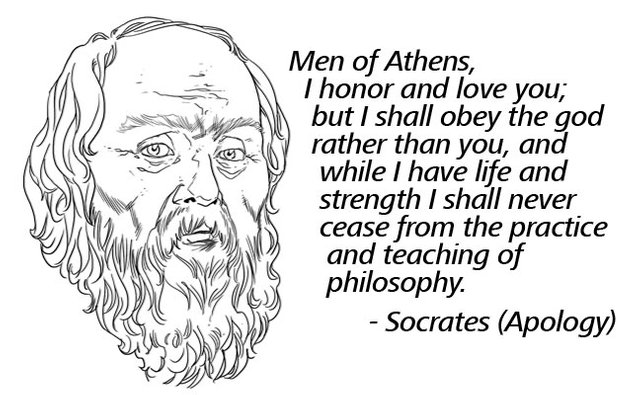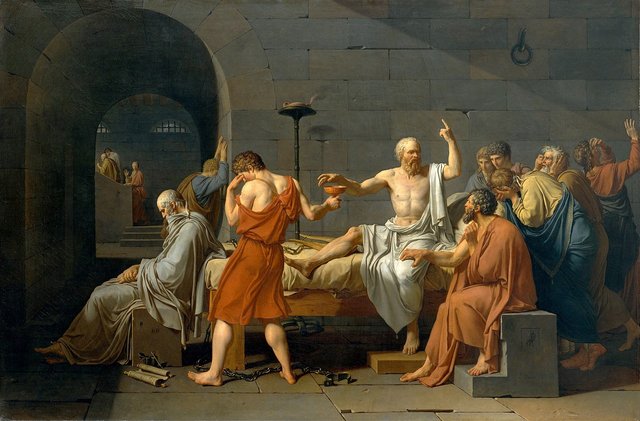Socrates and Individualism, Part I - Historical & philosophical underpinnings of a graphic novel

As some of you may know, I've written - and I'm currently producing - a historical graphic novel about Socrates' trial and execution. I've made several posts here regarding my artist selection process, and I have been lucky to receive some great feedback and input from the Steemit community. Socrates' story, and the history of ancient Greece in general, has long been a passion of mine, and I've spent years studying the era (though, admittedly, as a non-academic).
In this series of posts I'd like to share with you some of the historical and philosophical perspective that will be the foundation of the coming graphic novel.

In 399 BCE Socrates and a small band of his friends gathered in a prison cell to discuss philosophy for the final time. One month previous, an Athenian court had charged Socrates with three crimes: failure to acknowledge the city's gods; the creation of new ones; and corruption of the youth. A majority of the five-hundred man jury had found him guilty on all counts, and he was sentenced to death. Now, as sunset approached, it was time to carry out that sentence. When the jailer entered the cell carrying the cup of hemlock that would quench the philosopher's life, most of his comrades could not help but weep for the loss of such a friend. Socrates, however, upbraided them for their histrionics and accepted his cup. He cheerfully drank his death. Such was the end of Socrates who, as his greatest student Plato writes, “was of all those we have known the best, and also the wisest and most upright.”
I will seek to prove the following three theses: individualism, similar in essence to how we think of it today, was present and prevalent in ancient Athens; Socrates was the foremost representative of that creed; and, paradoxically, this supreme individualist – Socrates – was put to death by Athens – the most liberal and enlightened city of its age – precisely because of his individualism.

The Death of Socrates, Jacque-Louis David

Erich Fromm, the writer and psychoanalyst, has much to say about individualism and its effects on modern man. In his book, Escape From Freedom, Fromm describes not only individualism's positive, life-affirming aspects, but also the anxiety that grows out of the feeling of alienation which results when society's individual values apply only to exterior bonds, and not to the interior world of the self. Fromm calls this growth away from oneness with the world toward a knowledge of self and separateness “individuation”; and it is a process that can be found not only in the personal history of every man as he grows from the womb into adulthood, but also in the social history of mankind. It is the emergence from instinctual beast to thinking man. But this self-awareness has shone forth only during brief moments in history.
Karl Popper, the philosopher of science who also wrote much on sociology and the evils of totalitarianism, recognizes a similar historical process in man's growth from tribalism, or the closed society, to individualism, or the open society. In tribalism the only value lies in the group or state. It is a mindset where the individual becomes insignificant. Conversely we may define individualism as a trend in valuation where the individual takes precedence over the group. It is the belief that each man is an end in himself, that he is autonomous. Whereas in a collectivist or tribal morality the good is that which is in the interest of a group, tribe, or state, the good of an individualist morality is each person's separate happiness.
Do we have any evidence that Athenian citizens thought of themselves as individuals rather than as “inseparable parts of a biologic organism”? We certainly do. We can hear this sense of self in the words of Pericles, the famed Athenian statesman (as written by Thucydides in his Peloponnesian War):
Our constitution is called a democracy because power is in the hands not of a minority but of the whole people. When it is a question of settling private disputes, everyone is equal before the law; when it is a question of putting one person before another in positions of public responsibility, what counts is not membership of a particular class, but the actual ability which the man possesses.
Pericles' Funeral Oration, Phillipp Foltz
These are the values and ideas that Pericles expresses in his famed funeral oration of 430 BCE at the start of the Peloponnesian War. Even if we grant that Pericles was a career politician prone to exaggeration and rhetoric, this very rhetoric indicates that his words must have expressed ideals that Athenian citizens sought to achieve. Later in his speech Pericles makes his point even clearer: “I declare that in my opinion each single one of our citizens, in all the manifold aspects of life, is able to show himself the rightful lord and owner of his own person, and do this, moreover, with exceptional grace and exceptional versatility. [Italics mine]” Can there be a greater declaration of individualism than this?

Okay - that's it for Part 1. I don't want to overload you! You can find Part II HERE.
If you found this post interesting and/or useful, I certainly appreciate all upvotes and follows. And I'd love to continue the conversation in the comments below. Thanks for reading
References
- Fromm, Erich. Escape From Freedom. New York: Henry Holt and Co., 1941.
- Plato. Phaedo. Trans. G.M.A. Grube. Indianapolis: Hackett Publishing Co., 1981.
- Plato. Republic, The. Trans. Desmond Lee. London: Penguin Books, 1974.
- Popper, Karl R. The Open Society and Its Enemies Vol. 1 The Spell of Plato. Princeton: Princeton University Press, 1962.
- Thucydides. History of the Peloponnesian War. Trans. Rex Warner. London: Penguin Books, 1954.
I wonder why this doesn't have a bigger discussion yet! This is a really interesting premise and pretty unusual for graphic novels. It seems like the ancient greeks already figured that "being yourself" counts for something!
Yeah, even @originalworks is ignoring me... :) Heh.
Yes. There are differences between then and modern individualism; but there are also plenty of similarities. Thanks for taking a look!
@originalworks
You got a 3.18% upvote from @upmewhale courtesy of @jpgaltmiller!